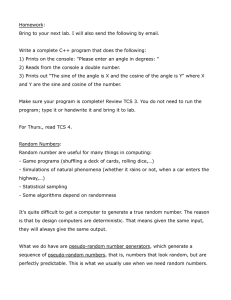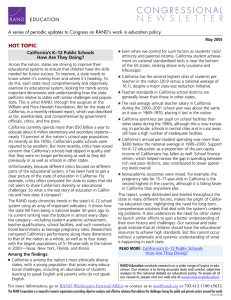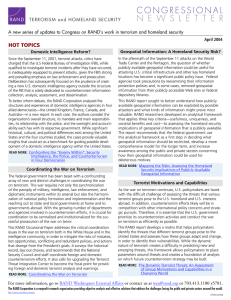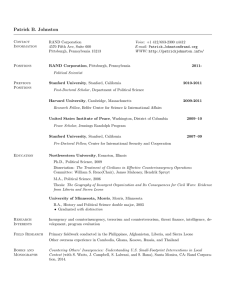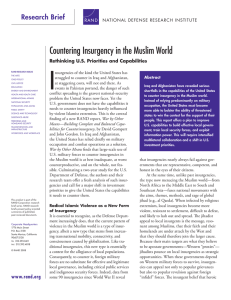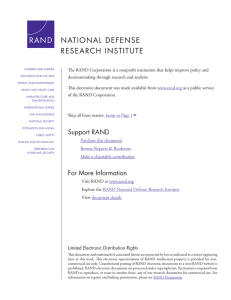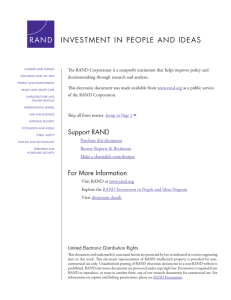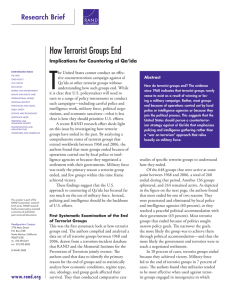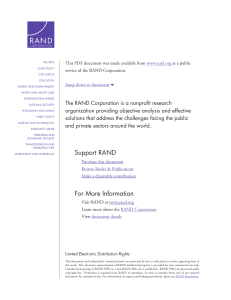HOT TOPICS
advertisement
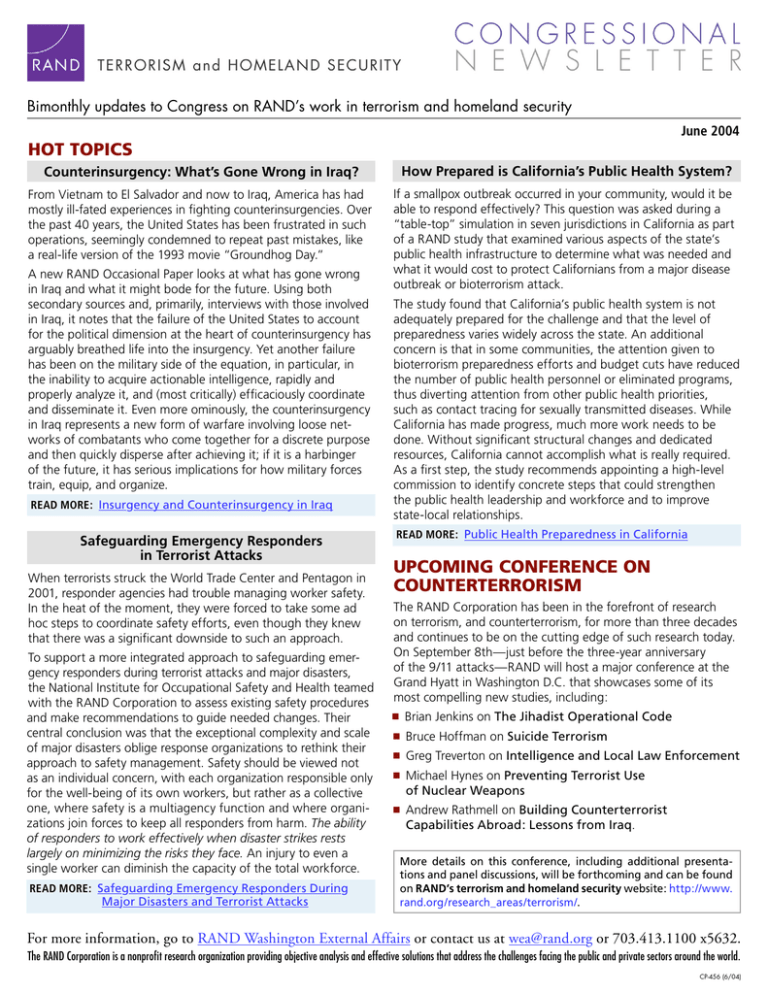
Bimonthly updates to Congress on RAND’s work in terrorism and homeland security June 2004 HOT TOPICS Counterinsurgency: What’s Gone Wrong in Iraq? How Prepared is California’s Public Health System? From Vietnam to El Salvador and now to Iraq, America has had mostly ill-fated experiences in fighting counterinsurgencies. Over the past 40 years, the United States has been frustrated in such operations, seemingly condemned to repeat past mistakes, like a real-life version of the 1993 movie “Groundhog Day.” If a smallpox outbreak occurred in your community, would it be able to respond effectively? This question was asked during a “table-top” simulation in seven jurisdictions in California as part of a RAND study that examined various aspects of the state’s public health infrastructure to determine what was needed and what it would cost to protect Californians from a major disease outbreak or bioterrorism attack. A new RAND Occasional Paper looks at what has gone wrong in Iraq and what it might bode for the future. Using both secondary sources and, primarily, interviews with those involved in Iraq, it notes that the failure of the United States to account for the political dimension at the heart of counterinsurgency has arguably breathed life into the insurgency. Yet another failure has been on the military side of the equation, in particular, in the inability to acquire actionable intelligence, rapidly and properly analyze it, and (most critically) efficaciously coordinate and disseminate it. Even more ominously, the counterinsurgency in Iraq represents a new form of warfare involving loose networks of combatants who come together for a discrete purpose and then quickly disperse after achieving it; if it is a harbinger of the future, it has serious implications for how military forces train, equip, and organize. READ MORE: Insurgency and Counterinsurgency in Iraq Safeguarding Emergency Responders in Terrorist Attacks When terrorists struck the World Trade Center and Pentagon in 2001, responder agencies had trouble managing worker safety. In the heat of the moment, they were forced to take some ad hoc steps to coordinate safety efforts, even though they knew that there was a significant downside to such an approach. To support a more integrated approach to safeguarding emergency responders during terrorist attacks and major disasters, the National Institute for Occupational Safety and Health teamed with the RAND Corporation to assess existing safety procedures and make recommendations to guide needed changes. Their central conclusion was that the exceptional complexity and scale of major disasters oblige response organizations to rethink their approach to safety management. Safety should be viewed not as an individual concern, with each organization responsible only for the well-being of its own workers, but rather as a collective one, where safety is a multiagency function and where organizations join forces to keep all responders from harm. The ability of responders to work effectively when disaster strikes rests largely on minimizing the risks they face. An injury to even a single worker can diminish the capacity of the total workforce. READ MORE: Safeguarding Emergency Responders During Major Disasters and Terrorist Attacks The study found that California’s public health system is not adequately prepared for the challenge and that the level of preparedness varies widely across the state. An additional concern is that in some communities, the attention given to bioterrorism preparedness efforts and budget cuts have reduced the number of public health personnel or eliminated programs, thus diverting attention from other public health priorities, such as contact tracing for sexually transmitted diseases. While California has made progress, much more work needs to be done. Without significant structural changes and dedicated resources, California cannot accomplish what is really required. As a first step, the study recommends appointing a high-level commission to identify concrete steps that could strengthen the public health leadership and workforce and to improve state-local relationships. READ MORE: Public Health Preparedness in California UPCOMING CONFERENCE ON COUNTERTERRORISM The RAND Corporation has been in the forefront of research on terrorism, and counterterrorism, for more than three decades and continues to be on the cutting edge of such research today. On September 8th—just before the three-year anniversary of the 9/11 attacks—RAND will host a major conference at the Grand Hyatt in Washington D.C. that showcases some of its most compelling new studies, including: ■ Brian Jenkins on The Jihadist Operational Code ■ Bruce Hoffman on Suicide Terrorism ■ Greg Treverton on Intelligence and Local Law Enforcement ■ Michael Hynes on Preventing Terrorist Use of Nuclear Weapons ■ Andrew Rathmell on Building Counterterrorist Capabilities Abroad: Lessons from Iraq. More details on this conference, including additional presentations and panel discussions, will be forthcoming and can be found on RAND’s terrorism and homeland security website: http://www. rand.org/research_areas/terrorism/. For more information, go to RAND Washington External Affairs or contact us at wea@rand.org or 703.413.1100 x5632. The RAND Corporation is a nonprofit research organization providing objective analysis and effective solutions that address the challenges facing the public and private sectors around the world. CP-456 (6/04)


